Economy
Orban slams US deal, says Trump ‘ate’ EU chief ‘for breakfast’
Hungarian Prime Minister Viktor Orban on Monday lashed out at a new trade deal the European Union reached a day earlier with the U.S., saying the agreement is “worse” than the deal the U.K. clinched.
“Donald Trump did not reach an agreement with Ursula von der Leyen, but rather Donald Trump ate Ursula von der Leyen for breakfast,” Orban said during a Facebook livestream hosted by his party’s spokesperson.
The framework trade agreement, which the U.S. and the EU agreed upon on Sunday, is worse than the trade deal that the U.K. reached with the U.S. earlier, he was also quoted as saying.
The deal imposes a 15% import tariff on most EU goods – half the threatened rate.
“This is not an agreement … (President) Donald Trump ate (European Commission President) Von der Leyen for breakfast, this is what happened and we suspected this would happen as the U.S. President is a heavyweight when it comes to negotiations, while Madame President is a featherweight,” Orban said.
Economy
UN urges Türkiye, Australia to end deadlock on COP31 hosting
Türkiye and Australia were called on Monday to resolve their long-running tussle over who will host next year’s COP31 summit, with the United Nations climate chief calling the delay unhelpful and unnecessary.
The two countries submitted bids to host the high-profile conference in 2022 and they have both refused to concede to the other ever since.
Simon Stiell, executive secretary of the U.N. Framework Convention on Climate Change, which oversees COP summits, said the deadlock was undermining preparations.
“A decision needs to be made very quickly,” he said at a Smart Energy Council event in Sydney. “The two proponents need to come together and between themselves and within the group to make that decision. The delay in making that decision is unhelpful to the process.”
The annual U.N. talks rotate through five regional groups. COP31’s host must be unanimously agreed upon by the 28 members of the Western Europe and Others Group (WEOG) bloc.
The U.N. had set a deadline of June for the group to reach consensus.
Despite Türkiye’s overwhelmingly greater experience in hosting global geopolitical events, its location and renewable energy sector, it has encountered pressure to drop out of the race. Ankara has instead doubled down on its efforts during interim talks in Bonn last month.
Ankara pointed out that its Mediterranean location would help reduce emissions from flights bringing delegates to the conference, and noted its substantially smaller oil and gas industry compared to Australia.
It has been promising a world-class COP31 venue in Antalya, a seaside city that has previously hosted the G-20, NATO conferences and the Antalya Diplomacy Forum.
Australia is seeking to co-host next year’s summit with the Pacific to showcase its renewable energy transition. It had hoped to secure the bid at COP29 in Azerbaijan.
The U.K., a WEOG member, last week reiterated its support for fellow Commonwealth country Australia, and “expressed the hope that a decision would soon be reached” during Australia-U.K. Ministerial Consultations held in Sydney. Australia and the U.K. have the same head of state.
Stiell said the deadlock was now affecting the planning of the COP process, involving thousands of delegates from 200 member countries.
“In negotiations that are as complex as they are, that lack of clarity creates tensions that are completely unnecessary at this stage,” he said.
Asked for comment, the office of Australian Climate Change Minister Chris Bowen referred to an interview where he claimed Australia’s bid had the backing of 23 out of 28 WEOG members.
Australia had also approached Türkiye multiple times to find a “win-win” solution, he said. “We’ve got the votes. We could have all the votes in the world. If Turkey is not going to withdraw, that’s still a challenge,” Bowen told The Conversation Politics Podcast on Thursday.
At the same event, Stiell also called on Australia to set an ambitious 2035 emissions target and accelerate its clean energy transition.
Australia’s national climate plan, due in September, would be a “defining moment” that could send a message that “this country is open for clean investment, trade, and long-term partnerships,” he said.
Brazil is hosting COP30 in November this year on behalf of the Latin American and Caribbean region. The event holds significance as it will focus on assessing countries’ updated climate targets for 2035. Analysts have referred to it as possibly the most pivotal summit since the 2015 Paris COP, where the key climate agreement was established.
Türkiye has felt the effects of climate change, with repeated extreme weather events, including heat waves. Major Turkish lakes, such as Lake Van in the east and Lake Tuz in Central Anatolia, are drying up.
In October 2021, Türkiye became the last Organisation for Economic Co-operation and Development (OECD) and G-20 country to sign the Paris Agreement on limiting the effects of climate change.
According to official statistics, 36.2% of Türkiye’s electricity was generated from coal in 2023, and 21% from natural gas. Hydropower contributed 19.3%, wind 10%, and solar power 7%.
Türkiye boasts more than 33 gigawatts (GW) of installed capacity in wind and solar energy. It plans to lift this figure to 120 GW by 2035, according to the government’s targets.
It aims at reducing greenhouse gas emissions in line with its commitment to become a net-zero emission economy by 2053.
At COP29 in Azerbaijan, a group of nations, including all European Union member states, Canada, Mexico and Norway, pledged to set climate targets aligned with the Paris Agreement’s aspirational goal of limiting warming to 1.5 degrees Celsius (2.8 degrees Fahrenheit). The U.S. did not join this commitment.
Experts hailed the announcement as a positive sign, particularly as the pace of the energy transition faces challenges and the world continues to break new high-temperature records each year.
Economy
Europe reacts with relief, concern, doubt to US trade deal
European governments and major companies reacted with a mixture of relief, concern and doubt on Monday to the framework trade deal struck with U.S. President Donald Trump, acknowledging what was seen as an unbalanced deal but one that avoided a deeper trade war.
The agreement, announced on Sunday between the two economies that account for almost a third of global trade, will see the U.S. impose a 15% import tariff on most EU goods – half the threatened rate but much more than what Europeans hoped for.
Many of the specifics of the deal were not immediately known, however.
“As we await full details of the new EU-U.S. trade agreement, one thing is clear: this is a moment of relief but not of celebration,” Belgian Prime Minister Bart De Wever wrote on X. “Tariffs will increase in several areas and some key questions remain unresolved.”
Trump said the deal, including an investment pledge topping the $550 billion deal signed with Japan last week, would expand ties between the trans-Atlantic powers after years of what he called unfair treatment of U.S. exporters.
It will bring clarity for European makers of cars, planes and chemicals. But the EU had initially hoped for a zero-for-zero tariff deal. And the 15% baseline tariff, while an improvement on the threatened rate of 30%, compares to an average U.S. import tariff rate of around 2.5% last year before Trump’s return to the White House.
European Commission chief Von der Leyen, describing Trump as a tough negotiator, told reporters on Sunday that it was “the best we could get.”
European stocks opened up on Monday, with the STOXX 600 at a four-month high and all other major bourses also in the green. Tech and health care stocks led the way.
“The 15% rate is better than the market was fearing,” said Jefferies economist Mohit Kumar.
German Chancellor Friedrich Merz welcomed the deal, saying it averted a trade conflict that would have hit Germany’s export-driven economy and its large auto sector hard.
More clarity but ‘not the end of the story’
French government ministers said on Monday that the deal had some merits – such as exemptions they hoped to see for some key French business sectors such as spirits – but was nevertheless not balanced.
Industry minister Marc Ferracci stressed more talks – potentially lasting weeks or months – would be needed before the deal could be formally concluded.
“This is not the end of the story,” he told RTL radio.
European companies, meanwhile, were left wondering whether to cheer or lament the accord.
“Those who expect a hurricane are grateful for a storm,” said Wolfgang Grosse Entrup, head of the German Chemical Industry Association VCI.
“Further escalation has been avoided. Nevertheless, the price is high for both sides. European exports are losing competitiveness. U.S. customers are paying the tariffs,” he said.
Stellantis shares were up 3.5% and car parts maker Valeo jumped 4.7% while German pharma group Merck KGaA rose 2.9%, in a sign of relief for those sectors.
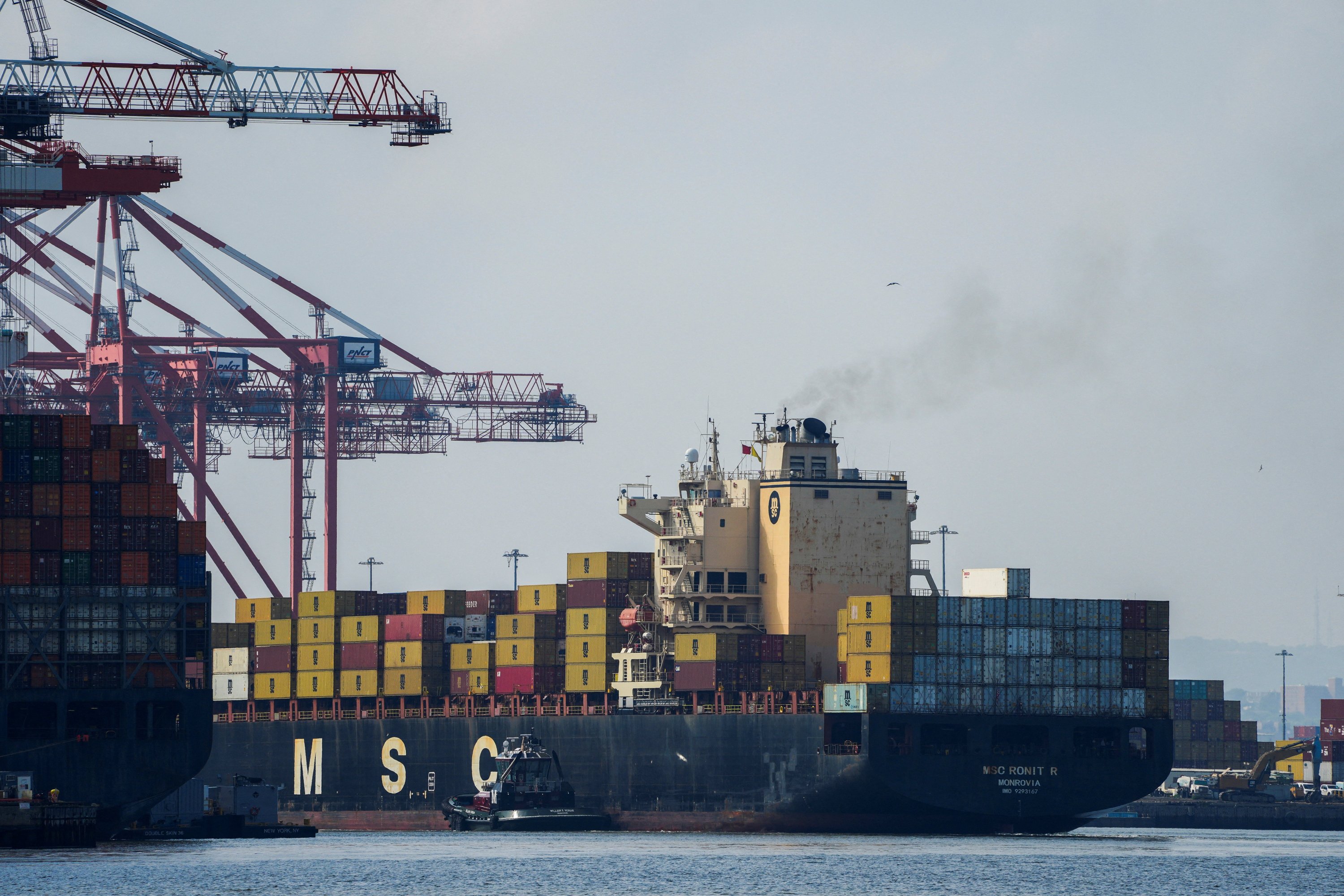
Among the many questions that remain to be answered, however, is how the EU’s promise to invest hundreds of billions of dollars in the U.S. and steeply increase energy purchases can be turned into reality.
It was not immediately clear if specific pledges of increased investments were made or whether the details still must be hammered out.
And while the EU pledged to make $750 billion in strategic purchases over the next three years, including oil, liquefied natural gas (LNG) and nuclear fuel, the U.S. will struggle to produce enough to meet that demand.
While U.S. LNG production capacity is due to almost double over the next four years, it will still not be enough to ramp up supplies to Europe, and oil production is expected to be lower than previously forecast this year.
Despite the lingering unknowns, analysts stressed the deal still helped decrease uncertainty. Oil prices rose on Monday, as did the euro.
“Now that there is more clarity, you would think that not only in the United States, but around the globe, there will be a little bit more willingness to look at investment, to look at expansions, and to look at where the opportunities are,” said Rodrigo Catril, senior currency strategist at National Australia Bank.
Economy
Türkiye market inflation expectations fall to nearly 4-year low
Expectations for inflation in Türkiye in 12 months time dropped in July for market participants and businesses, while they rose for households, according to a central bank survey on Monday.
The market participants’ expectations fell by 1.2 percentage points to 23.4%, the Central Bank of the Republic of Türkiye (CBRT) said. Treasury and Finance Minister Mehmet Şimşek said that the level marked the lowest in nearly four years.
The real sector’s expectations declined by 0.8 percentage points to 39.0%. In contrast, household expectations rose by 1.5 percentage points to 54.5%.
The share of households expecting inflation to fall over the next 12 months dropped by 4.1 points to 26.6%.
Turkish annual consumer price inflation slowed to 35% in June, extending its fall from a peak of around 75% in May 2024. The central bank’s year-end inflation midpoint estimate currently stands at 24%, in a forecast range of 19% to 29%.
The CBRT has repeatedly said it closely monitors the alignment of inflation expectations and pricing behavior with its own projections. While household and business expectations remain elevated, market forecasts are more optimistic and closer to official targets.
“Inflation expectations for market participants and the real sector continued to decline compared to the previous month, while household expectations increased,” Şimşek wrote on social media platform X.
“Market participants’ expectation for inflation in 12 months time has fallen to 23.4%, the lowest level in 43 months,” he said.
Şimşek added that compared to last year, real sector and household expectations were down by 16 and 17.5 percentage points, respectively.
“With our resolutely implemented comprehensive policies, we are taking firm steps toward permanent price stability and sustainable growth,” the minister said.
On Sunday, Şimşek said the government expects inflation to end the year “within the central bank’s midpoint to high forecast range. We expect a figure below 29%.”
The central bank last week returned to its easing cycle as it cut its benchmark interest rate by a larger-than-expected 300 basis points to 43%, as disinflation continues.
Going forward, the bank said it would determine the “step size” of future monetary easing “prudently” and on a meeting-to-meeting basis. It also lowered the upper band of its rate corridor to 46% from 49%.
The bank hiked the policy rate to 46% from 42.5% in April, reversing an easing cycle that had begun in December, following market volatility over the arrest in March of Istanbul Mayor Ekrem Imamoğlu.
Imamoğlu was jailed pending trial over graft charges.
Şimşek on Sunday said the economy has returned to a “positive cycle” after market turbulence in March.
The bank said the underlying inflation trend remained flat in June and it anticipated a “temporary rise” in monthly inflation this month due to one-off factors.
Credit ratings agency Moody’s on Friday upgraded Türkiye’s rating to “Ba3” from “B1,” citing improving monetary policy credibility, easing inflation and reduced economic imbalances.
Economy
French PM Bayrou calls US trade deal ‘dark day for Europe’
French Prime Minister Francois Bayrou called a framework trade deal between the U.S. and European Union a “dark day” for Europe, saying the bloc had caved in to U.S. President Donald Trump’s pressure with an unbalanced deal that slaps a headline 15% tariff on EU goods while sparing U.S. imports from any immediate European retaliation.
The criticism from Bayrou followed months of French calls for EU negotiators to take a tougher stance against Trump by threatening reciprocal measures – a position that contrasted with the more conciliatory approaches of Germany and Italy.
“It is a dark day when an alliance of free peoples, brought together to affirm their common values and to defend their common interests, resigns itself to submission,” Bayrou wrote on X of what he called the “von der Leyen-Trump deal.”
The high-level French criticism and President Emmanuel Macron’s silence since the deal was signed between Trump and European Commission President Ursula von der Leyen stood in stark contrast to the more benign reactions from Berlin and Rome.
French government ministers acknowledged the agreement had some benefits – including exemptions for sectors such as spirits and aerospace – but said it remained fundamentally unbalanced.
“This state of affairs is not satisfactory and cannot be sustained,” French European Affairs Minister Benjamin Haddad said on X, urging the EU to activate its so-called anti-coercion instrument, which would allow for non-tariff retaliation.
Trade Minister Laurent Saint-Martin criticized the EU’s handling of the negotiations, saying the bloc should not have refrained from hitting back in what he described as a power struggle initiated by Trump.
“Donald Trump only understands force,” he told France Inter radio. “It would have been better to respond by showing our capacity to retaliate earlier. And the deal could have probably looked different,” he added.
Macron had said that the EU should respond in kind if Washington slapped tariffs on EU goods and apply equivalent measures on U.S. imports into the bloc, in particular on services, in which the U.S. enjoys a surplus with the EU.
However, the softer line advocated by German Chancellor Friedrich Merz and Italian Prime Minister Giorgia Meloni, whose countries are more dependent on exports to the U.S. than France, prevailed.
Economy
US, Chinese officials meet again in effort to extend tariff truce
Top U.S. and Chinese economic officials are set to meet again on Monday to renew trade negotiations with an extension of lower tariff levels on the cards.
Talks between the world’s two largest economies are scheduled to take place over two days in Stockholm, the Swedish capital and come as other countries rush to finalize deals with Washington.
For dozens of trading partners, failing to strike an agreement in the coming days means they could face significant tariff hikes on exports to the U.S. come Friday, Aug. 1.
The steeper rates, threatened against partners like Brazil and India, would raise the duties their products face from a “baseline” of 10% now to levels up to 50%.
Tariffs imposed by the Trump administration have already effectively raised duties on U.S. imports to levels not seen since the 1930s, according to data from The Budget Lab research centre at Yale University.
For now, all eyes are on discussions between Washington and Beijing as a delegation including U.S. Treasury Secretary Scott Bessent meets a Chinese team led by Vice Premier He Lifeng in Sweden.
Beijing said on Monday it hoped the two sides could hold talks in the spirit of “mutual respect and reciprocity.”
Foreign Ministry spokesperson Guo Jiakun said Beijing sought to “enhance consensus through dialogue and communication, reduce misunderstandings, strengthen cooperation and promote the stable, healthy and sustainable development of China-U.S. relations.”
While both countries imposed tariffs on each other’s products in April, reaching triple-digit levels, U.S. duties this year have been temporarily lowered to 30%, and China’s countermeasures have been slashed to 10%.
But the 90-day truce, instituted after talks in Geneva in May, is set to expire on Aug. 12.
Since the Geneva meeting, the two sides have convened in London to iron out disagreements.
China progress?
“There seems to have been a fairly significant shift in (U.S.) administration thinking on China since, particularly the London talks,” said Emily Benson, head of strategy at Minerva Technology Futures.
“The mood now is much more focused on what’s possible to achieve, on warming relations where possible and restraining any factors that could increase tensions,” she told Agence France Presse (AFP).
Talks with China have not produced a deal, but Benson said both countries have made progress, with certain rare earth and semiconductor flows restarting.
“Secretary Bessent has also signalled that he thinks a concrete outcome will be to delay the 90-day tariff pause,” she said. “That’s also promising, because it indicates that something potentially more substantive is on the horizon.”
The South China Morning Post, citing sources on both sides, reported Sunday that Washington and Beijing are expected to extend their tariff pause by another 90 days.
Trump has announced pacts so far with the European Union, Britain, Vietnam, Japan, Indonesia and the Philippines, although details have been sparse.
An extension of the U.S.-China deal to keep tariffs at reduced levels “would show that both sides see value in continuing talks,” said Thibault Denamiel, a fellow at the Centre for Strategic and International Studies.
U.S.-China Business Council President Sean Stein said the market was not anticipating a detailed readout from Stockholm: “What’s more important is the atmosphere coming out.”
“The business community is optimistic that the two presidents will meet later this year, hopefully in Beijing,” he told AFP.
“It’s clear that on both sides, the final decision-maker is going to be the president.”
Far from ideal
For others, the prospect of higher U.S. tariffs and few details from fresh trade deals marks “a far cry from the ideal scenario,” said Denamiel.
But they show some progress, particularly with partners that Washington has signaled are on its priority list, like the EU, Japan, the Philippines and South Korea.
The EU unveiled a pact with Washington on Sunday, while Seoul is rushing to strike an agreement, following Japan and the Philippines, which have already reached the outlines of deals.
Breakthroughs have been patchy since Washington promised a flurry of agreements after unveiling and then swiftly postponing tariff hikes targeting dozens of economies in April.
Denamiel warned of overlooking countries that fall outside Washington’s priority list.
Solid partnerships are needed, he said, if Washington wants to diversify supply chains, enforce advanced technology controls, and tackle excess Chinese capacity.
Economy
Google admits failure to alert millions during Türkiye’s 2023 quakes
Google has acknowledged that its early warning system had failed to deliver critical alerts to millions of people during Türkiye’s deadliest earthquakes more than two years ago, a report said on Monday.
Had the algorithms functioned properly, around 10 million people within 157 kilometers (97.56 miles) of the epicenter could have received the highest-level warning up to 35 seconds before the shaking began.
In reality, just 469 people received the alert during the first 7.8 magnitude quake that struck southeastern Türkiye in the early hours of Feb. 6, 2023, while roughly 500,000 received a lower-level notification for mild tremors, Google told the BBC.
The tech giant previously said the system, named Android Earthquake Alerts (AEA), had “performed well.”
More than 55,000 people died and over 100,000 were injured in the twin tremors, many of them caught in their sleep.
The AEA is run by the Silicon Valley firm, not individual countries. It works on Android devices, which are said to make up more than 70% of the phones in Türkiye.
The highest-level alert in AEA is the “Take Action” warning. It triggers a loud alarm that bypasses the Do Not Disturb mode and takes over the phone’s screen. This alert is intended for situations where intense shaking is detected and poses a danger to human life.
A lower-level alert, called “Be Aware,” notifies users about possible mild tremors. Unlike the more urgent warning, it doesn’t interrupt devices that are set to Do Not Disturb.
Google’s early warning system was in place and live on the day of the Feb. 6 quakes. However, it underestimated how strong the tremors were.
It initially estimated the magnitude of the first earthquake at 4.5-4.9 rather than the actual 7.8, BBC cited researchers as explaining in the Science journal.
A similar underestimation occurred during the second quake, leading to only 8,158 phones receiving the “Take Action” alert and 4 million getting the less urgent “Be Aware” notification.
Following the disaster, Google revised its algorithms and ran simulations showing that the updated system would have delivered “Take Action” alerts to 10 million devices and “Be Aware” notifications to 67 million people.
“Every earthquake early warning system grapples with the same challenge – tuning algorithms for large magnitude events,” Google told the BBC. The company argued that its alerts are not a replacement for national warning systems.
Critics, however, say the two-year delay in disclosing the system’s failure is unacceptable.
“We’re not talking about a little event – people died – and we didn’t see a performance of this warning in the way we would like,” Elizabeth Reddy, assistant professor at Colorado School of Mines, told the BBC.
-

 Daily Agenda3 days ago
Daily Agenda3 days agoMartyr Akut staff was sent off on their last journey
-

 Daily Agenda3 days ago
Daily Agenda3 days ago4 countries came together during the historical meeting in Istanbul
-
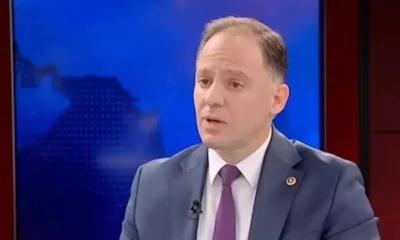
 Daily Agenda3 days ago
Daily Agenda3 days agoCHP’li Deniz Yavuzyılmaz’s lies even Gok rebelled! Algorithms know the truth, the CHP distortes…
-
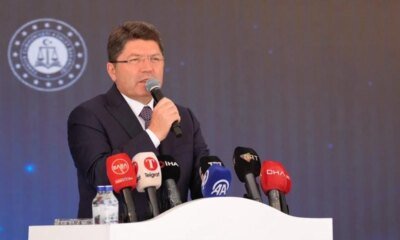
 Daily Agenda3 days ago
Daily Agenda3 days agoJustice Minister Gaziantep spoke in Gaziantep: “Türkiye will be without terrorism”
-

 Daily Agenda2 days ago
Daily Agenda2 days agoTurkish Defense Industry changed the course of the war
-

 Economy3 days ago
Economy3 days agoMoody’s upgrades Türkiye’s rating, changes outlook to stable
-
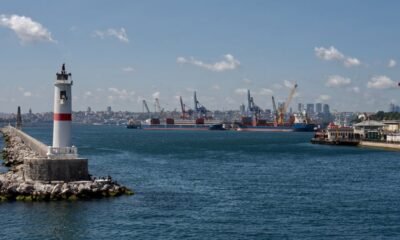
 Economy2 days ago
Economy2 days agoTürkiye sees exports to Africa near $10B in 1st half of 2025
-
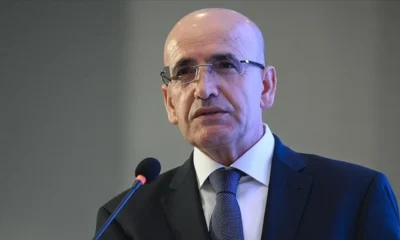
 Daily Agenda2 days ago
Daily Agenda2 days agoTreasury and Finance Minister Şimşek spoke at IDEF 2025: The number of projects that Türkiye is working on is over 1100!




